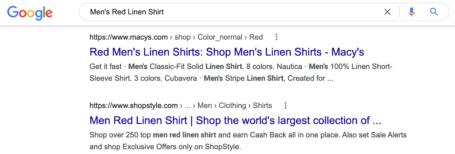
To be a page, or not to be a page, that is the question.
You want to rank for Men’s Red Linen Shirts. Do you create a new page around this keyword phrase, or simply mention Red on the Men’s Linen Shirts page?
Many lean toward new pages, but low search volume alone, if present, should prevent them. Furthermore, this process always has a cost.
In our example, you’ll have near-endless combinations with sleeve length, fit type, use case, and more. Too many pages dilute backlinks, create duplicate content, and lead to confusing UX.
These deeper pages may even fail to match intent, with Google showing more general pages anyway.
Yet, being specific does improve relevancy.
Like SEO as a whole, this decision is a balancing act unique to every business. The solution must lie mostly within the search engine results themselves. Are the pages shown closely aligning with the query you enter or representing a larger scope?
You then analyze the main factors driving your competition’s success, then make a plan to be exceptional. A good SEO can help you do this comprehensively.
So regarding the choice to be a page or not to be a page: start by inverting, working backward from the potential end result.
